|
|
|
Sort Order |
|
|
|
Items / Page
|
|
|
|
|
|
|
| Srl | Item |
| 1 |
ID:
128097
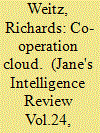

|
|
|
|
|
| Publication |
2012.
|
| Summary/Abstract |
Russia's announcement that it does not want to renew the co-operative threat reducing programme with the United States has raised questions about the bilateral relationship. Richard Weitz investigates what it means for future agreements.
|
|
|
|
|
|
|
|
|
|
|
|
|
|
|
|
| 2 |
ID:
130920
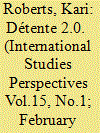

|
|
|
|
|
| Publication |
2014.
|
| Summary/Abstract |
This paper asks whether the recent "reset" in Russia-US relations parallels the Cold War reprieve from East to West tensions during Détente. The author considers the enthusiasm for this reset shared by Presidents Medvedev and Obama and acknowledges the benefits accrued for Russia as a result of better relations with the United States. In so doing, the paper argues that the Medvedev-Obama reset is not the result of a convergence of liberal-minded principles shared by the leadership, due in large part to the absence of a meaningful commitment on the part of Medvedev to bring about meaningful liberal reforms in Russia. In fact, the reset seems more the result of a desire by both leaders to shed past ideological disagreements in favor of a more pragmatic approach to relations, based upon mutual benefit. The paper then concludes that the current reset is not a temporary warming of relations akin to a second-generation détente because there was no "new Cold War" to abate. The paper contributes to the growing body of opinion that acknowledges a need for analysts and practitioners to search for a better lens through which to view Russia-US relations than the Cold War prism that persistently frames our analysis.
|
|
|
|
|
|
|
|
|
|
|
|
|
|
|
|
| 3 |
ID:
130862
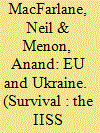

|
|
|
|
|
| Publication |
2014.
|
| Summary/Abstract |
EU members did not take long-standing Russian positions seriously, assumed any neighbour would be eager to sign up for 'more Europe', and have failed to generate a viable reply to Moscow's intervention. Events in Ukraine represent the most significant security crisis in Europe since the collapse of the Soviet Union. The Geneva accord of April this year, intended to secure de-escalation, has been violated by Russia, by 'local' forces in eastern Ukraine and, arguably, by the Ukrainian government itself. Russian Foreign Minister Sergei Lavrov has warned that Russia will defend its interests in eastern Ukraine, if necessary with attacks similar to those in Georgia in 2008. Small US deployments are occurring in the Baltics and Poland. Russia has resumed military exercises near the frontier with Ukraine. The escalatory dynamic is clear.
|
|
|
|
|
|
|
|
|
|
|
|
|
|
|
|
| 4 |
ID:
132698
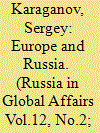

|
|
|
|
|
| Publication |
2014.
|
| Summary/Abstract |
Debates over the ongoing crisis in relations between Russia and the West revolve around the incorporation of Crimea, the global reaction to that move, and the future configuration of the Ukrainian state if, of course, it manages to survive (and I hope it will). But I contend that these are not the primary issues in global terms. There are other crucial questions. The first is what the European security system will be like. I repeat: the Old World was not allowed to withdraw from the Cold War, and now it may see a new round of tension. The second important question is whether Russia will be able to overcome the impasse in its development, in which it found itself after it restored statehood at the end of the 2000s. The third and closely linked question is whether Russia will wish to remain part - even an independent and very special partner - of Europe or will it opt for cultural-civilizational isolation and increasingly lean towards the East economically. It is obvious that Russia is firmly determined to change the rules of the game that have been dictated to it for the past twenty-five years. Unable and reluctant to toe the line, Russia has given up attempts to become part of the West.
|
|
|
|
|
|
|
|
|
|
|
|
|
|
|
|
| 5 |
ID:
132699
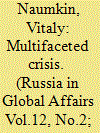

|
|
|
|
|
| Publication |
2014.
|
| Summary/Abstract |
The impact of the Ukrainian crisis on the existing world order proves to be so manifold that it is hard to predict its consequences, irrespective of its outcome. This short article touches upon only a few aspects of the problem.
|
|
|
|
|
|
|
|
|
|
|
|
|
|
|
|
| 6 |
ID:
132697
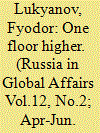

|
|
|
|
|
| Publication |
2014.
|
| Summary/Abstract |
It is already becoming habitual: yet another turn in world politics - and a fondly prepared portfolio of materials has to be shelved, and new ones made in an emergency mode. Witnessing epoch-making events is fascinating, but it takes a lot of nerve…
The period from February to April 2014 marked the sharpest turn in history since the end of the Cold War. We have witnessed the actual collapse of the Ukrainian statehood which emerged after the abolition of the Soviet Union, Crimea's entry into the Russian Federation, and an upsurge in confrontation between Moscow and the West. No wonder life made us revise our plans and devote the entire issue of Russia in Global Affairs to the changes which someone has already dubbed "Russian spring."
|
|
|
|
|
|
|
|
|
|
|
|
|
|
|
|
| 7 |
ID:
130469
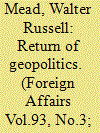

|
|
|
|
|
| Publication |
2014.
|
| Summary/Abstract |
So far, the year 2014 has been a tumultuous one, as geopolitical rivalries have stormed back to center stage. Whether it is Russian forces seizing Crimea, China making aggressive claims in its coastal waters, Japan responding with an increasingly assertive strategy of its own, or Iran trying to use its alliances with Syria and Hezbollah to dominate the Middle East, old-fashioned power plays are back in international relations. The United States and the EU, at least, find such trends disturbing. Both would rather move past geopolitical questions of territory and military power and focus instead on ones of world order and global governance: trade liberalization, nuclear nonproliferation, human rights, the rule of law, climate change, and so on. Indeed, since the end of the Cold War, the most important objective of U.S. and EU foreign policy has been to shift international relations away from zero-sum issues toward win-win ones. To be dragged back into old-school contests such as that in Ukraine doesn't just divert time and energy away from those important questions; it also changes the character of international politics. As the atmosphere turns dark, the task of promoting and maintaining world order grows more daunting. But Westerners should never have expected old-fashioned geopolitics to go away. They did so only because they fundamentally misread what the collapse of the Soviet Union meant: the ideological triumph of liberal capitalist democracy over communism, not the obsolescence of hard power. China, Iran, and Russia never bought into the geopolitical settlement that followed the Cold War, and they are making increasingly forceful attempts to overturn it. That process will not be peaceful, and whether or not the revisionists succeed, their efforts have already shaken the balance of power and changed the dynamics of international politics.
|
|
|
|
|
|
|
|
|
|
|
|
|
|
|
|
| 8 |
ID:
132041
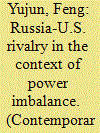

|
|
|
|
|
| Publication |
2014.
|
| Summary/Abstract |
Compared to Soviet-U.S. relations of the Cold War era, contemporary Russia-U.S. relations are less decisively in?uential in shaping the global strategic situation. While evolving, the new relationship between the two sometimes registers dramatic events-Syria and Ukraine, for example-that seem to endanger a proposed "reset" of their bilateral relations. This reset, first mentioned during the presidencies of Dmitry Medvedev in Russia and the first term of Barack Obama in the U.S., was not launched. Since the onset of the global ?nancial crisis, the international strategic situation has further readjusted, and big power relations have remained out of equilibrium. Progress toward improved relations witnessed "apathy" after Vladimir Putin returned to power. Both countries pay less attention to each other in their respective foreign agendas but they are wrestling fiercely in the ?elds of politics, security and geopolitics in spite of an accelerating imbalance of strategic power.
|
|
|
|
|
|
|
|
|
|
|
|
|
|
|
|
| 9 |
ID:
092995
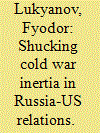

|
|
|
|
|
| Publication |
2009.
|
| Summary/Abstract |
Obama's declared approach of taking account of the views of other countries, reliance on multilateral institutions and consensus diplomacy will help to reshape Russian--US relations. The recent dialogue on strategic offensive armaments could well be the spark that will ignite the engine of Russian--American interaction on a wide range of issues. It is increasingly clear, however, that ideologies and nuclear arms will not be the driving forces of world politics in the 21st century. Under these circumstances, Russia can be either an opponent or a partner for Washington. Previously, the main problem in their relationship was the US' unwillingness to sacrifice any of its interests, even secondary ones. A new Russian--US partnership could be built on the similarities in their foreign policy priorities - their focus on regional conflicts and the need for stability in Eurasia.
|
|
|
|
|
|
|
|
|
|
|
|
|
|
|
|
| 10 |
ID:
130861
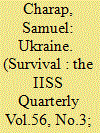

|
|
|
|
|
| Publication |
2014.
|
| Summary/Abstract |
The ugly truth is that Moscow can still undermine any Western plan for Ukraine's future. The crisis is likely to lead to a period of sustained disequilibrium and instability. As Ukraine's winter of domestic discord transformed into a spring of territorial partition and instability, European and American officials seemed to be speaking from an agreed set of talking points in their public remarks on the crisis. While hopeful transatlanticists sought to construe this remarkable consistency as a demonstration of a new seriousness of purpose in the West, the litany of warnings, threats and prescriptions for resolution (inevitably characterised as either an 'off-ramp' or 'de-escalation') spoke more to the desperation of those uttering them to quickly find a new, stable equilibrium for Ukraine, Russia and the international system. Yet the talking points and buzzwords, no matter how many times they are repeated, do not in fact describe either a sustainable equilibrium or an end point to the crisis. Instead, the disequilibrium and instability of the Ukrainian crisis seem likely to endure for some time: the search for a 'new normal' promises to be long, costly and highly disruptive of both individuals' lives and the international order.
|
|
|
|
|
|
|
|
|
|
|
|
|
|
|
|
| 11 |
ID:
130858
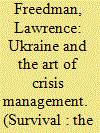

|
|
|
|
|
| Publication |
2014.
|
| Summary/Abstract |
Crisis management is the most demanding form of diplomacy. So far neither Russia nor the US and its European allies have handled it particularly well. Half a century ago, after the conflicts over Berlin and Cuba, a new term of art came into vogue: 'crisis management'. American Secretary of Defense Robert McNamara was even quoted as saying that crisis management had taken over from strategy.1 A small literature came to be devoted to the subject. In a number of respects, the term and the key themes it invoked were behind much of the debate on security policy for the remainder of the Cold War.2
The term 'crisis' comes from a Greek word indicating choice or decision, and came to refer to the turning point in a disease. The crisis was the moment when the fever reached a peak and the patient was either going to get a lot worse or a lot better. It is the moment usually marked in TV dramas by delirious patients, caring nurses, anxious relatives and lots of patting down of sweating foreheads with cold sponges. The idea of an international crisis has the same sense of stress and urgency. It means a conflict has come to a head, normally because one side has taken a bold but provocative initiative. At the moment of crisis, some big, long-standing conflict is about to be resolved, either through last-minute diplomacy or by force. The drama comes from a deadline, perhaps reinforced by an ultimatum, and intense media attention. On the news channels, the moment is usually marked by late nights in the corridors of power, emergency summits and tense United Nations Security Council meetings, while staying on the alert for military mobilisations and movements. Leaders of major powers would be expected to show that they had the temperament and character for a crisis. A steely resolve and calm judgement would be at a premium. This was the point of Hillary Clinton's famous challenge to candidate Barack Obama in 2008 as to how he would cope when 'it's 3 a.m. and your children are safe and asleep. But there's a phone in the White House and its ringing. Something's happening in the world.
|
|
|
|
|
|
|
|
|
|
|
|
|
|
|
|
|
|
|
|
|